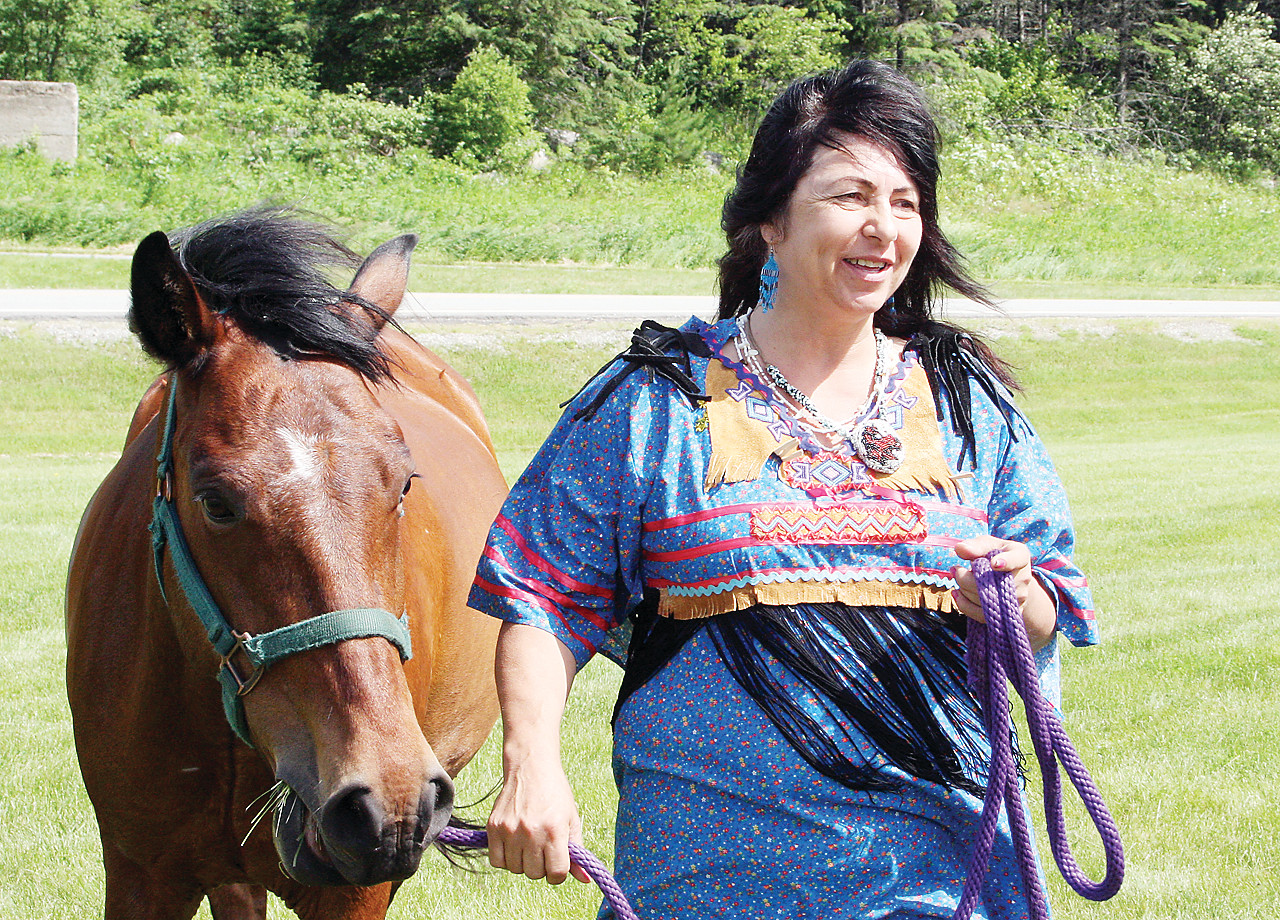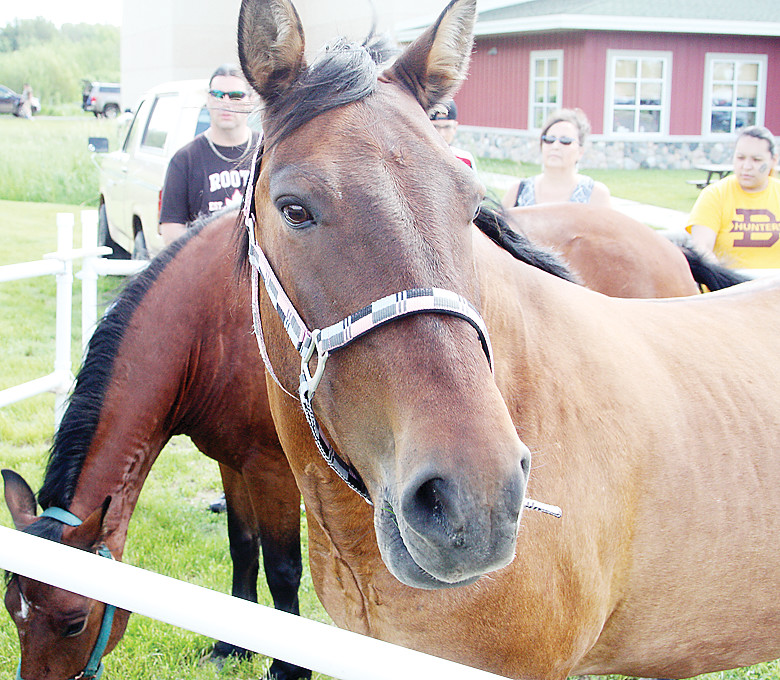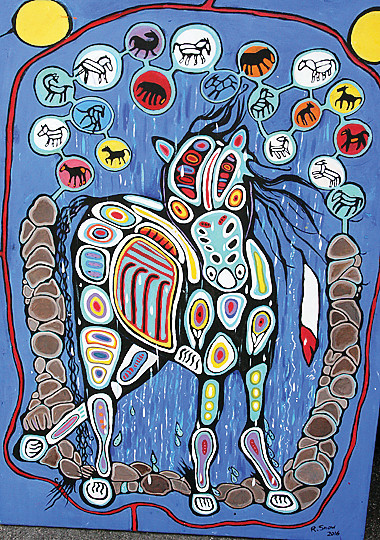Support the Timberjay by making a donation.
Horses and healing
An effort underway to restore Lac La Croix horses to the area
VERMILION RESERVATION—Can a horse help to heal your soul? It can, says Rhonda Snow, if you let it guide you.
For the past decade, a growing herd of rare Lac La Croix horses has led Snow down a …
This item is available in full to subscribers.
Attention subscribers
To continue reading, you will need to either log in to your subscriber account, or purchase a new subscription.
If you are a current print subscriber, you can set up a free website account and connect your subscription to it by clicking here.
If you are a digital subscriber with an active, online-only subscription then you already have an account here. Just reset your password if you've not yet logged in to your account on this new site.
Otherwise, click here to view your options for subscribing.
Please log in to continue |
Horses and healing
An effort underway to restore Lac La Croix horses to the area
VERMILION RESERVATION—Can a horse help to heal your soul? It can, says Rhonda Snow, if you let it guide you.
For the past decade, a growing herd of rare Lac La Croix horses has led Snow down a path of spiritual healing even as she faced painful personal and physical challenges that might have left her devastated. Snow, who lives in the bush about ten miles north of Fort Frances, Ontario, operates R&R Spirit Horse Ranch, a sanctuary and equine-assisted learning center that works mostly with young native people. She talked about her life with her horses during a recent visit to the Lake Vermilion Reservation with her partner Randy Stewart and two of her La Croix horses.
She was there to spread the message of her work with the horses in hopes of reconnecting Bois Forte Band members with these unique animals that, for generations, had thrived in a mostly wild state in the border country, including on the Nett Lake and Vermilion reservations.
Her visit came as Bois Forte members are hoping to bring some of Snow’s La Croix horses back to Nett Lake, as a means of honoring the breed’s historical significance and as a means of engaging young people. “We want to get young people involved in helping to care for the horses,” said Curt Goodsky, who is helping to spearhead the initiative. “We see it as having tremendous potential for developing youth leadership and healing,” said Goodsky. “Maybe we’ll even be planting a seed for a future veterinarian.”
Goodsky said many Bois Forte elders still remember when the stocky and powerful La Croix horses wandered the North Country. They lived essentially wild, eating native grasses and forbs in the summer, and shrubs or aspen bark during the winter. Occasionally, the Bois Forte would round up a few of the horses to help pulling logs from the woods or to pull sledges across the ice, but most of the time, they lived in the wild.
By the late 1990s, the Lac La Croix horses had nearly faded into history, a breed all but extinct. Yet in late 2006, Snow received a call from Rare Breeds Canada, a group that works to preserve rare horse breeds. The group had received a call from John Fisher, the longtime Cook area veterinarian, who told them that a small herd of the La Croix horses— no more than a dozen— were still living wild on the Nett Lake Reservation. The animals were being harassed by a local wolf pack and Fisher feared they would not survive the coming winter.
Snow organized a rescue team and in a November sleet storm she recalls tracking down and capturing nine of the horses, which were very likely among the very last of the breed still alive in the world.
Since then, she has managed to increase the herd to nearly three dozen, although she was forced to breed the La Croix mares with a Spanish mustang, since the only La Croix stallion she rescued was too old to breed. The La Croix horses still aren’t recognized as an official breed in Canada, but that’s only because it takes at least 200 animals to obtain formal recognition. That will likely take several more years.
It turns out, these extraordinary horses may be far more significant than biologists had ever suspected. The La Croix horses were long known to have characteristics, such as a distinctive nasal flap and an unusually heavy winter coat, which made them different from other modern horses in North America. Scientists have previously believed that all horses on the continent had all originated from the animals first brought to the New World by the Spanish in the 1500s or horses brought later from Europe.
But according to Snow, there’s solid evidence that the La Croix horses were in North America long before the Spanish arrived. Birch bark scrolls from the Leech Lake area, known to date back to the 1300s, make mention of the horses. Snow and Stewart also note that recent DNA analysis done at Texas A&M University has suggested links to Asian breeds within the La Croix horse lineage. Such evidence has convinced Snow and Stewart that the ancestors of La Croix horses may have crossed the land bridge from Asia along with humans during the last glacial period. Alternatively, since the modern horse originated in North America, a few could have survived in the remote boreal forests, rather than having gone extinct 11,000 years ago as most archeologists currently believe. If so, that would make this endangered breed of horse extraordinarily significant— in effect a surviving native North American horse.
Spirit horses
For the Ojibway people, says Snow, the ties to the La Croix horses run long and deep, with spiritual connections that can be hard to describe, particularly to non-native people. She’s talked to holy men within the Midewiwin, or Grand Medicine Society, who say they’ve encountered these horses in the spirit world, and Snow has turned to painting to better relate those stories.
Yet Snow has stories of her own, of how her La Croix horses have helped many, including herself, find solace and healing from physical and emotional injuries. “They’re very intuitive,” she said, noting that the horses are sensitive to the various energies that people exhibit, particularly those associated with addiction or emotional trauma. “The horses can sense things, and they do their own teaching. They can help us heal,” she said.
Snow is a certified equine assisted therapist, and over the years she and her horses have helped thousands of people, mostly young people, work through emotional and other developmental issues. It’s a specialized, yet well-accepted, form of therapy for a wide range of issues, including autism, post traumatic stress, Downs Syndrome, attention deficit disorder, traumatic brain injury, and chemical addiction.
Snow can relate to those she aids. A painful breakup from her husband, who didn’t share her commitment to the horses, followed by debilitating illness, left her emotionally and physically spent. She said her horses, plus some traditional medicine and help from Stewart, provided the solace and treatment she needed to find relief and get her life back on track.
At the same time, she acknowledges the burden of caring for her growing herd of La Croix horses, not to mention several other rare breeds she cares for at her ranch, has become overwhelming, which is why she’s seeking others to provide new homes for some of the animals. “We’re hoping to find some help. I just can’t do it anymore.”
She wants to see the La Croix horses brought back to Nett Lake, where most of her current herd originated. “They need to go back to the people,” she said. Yet she is also looking for the right people, someone, she said, “who will honor the horses and their history.” “They need to live the life that the Creator intended,” she said.











